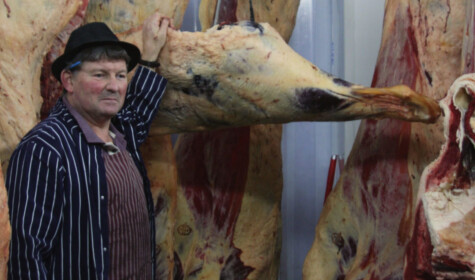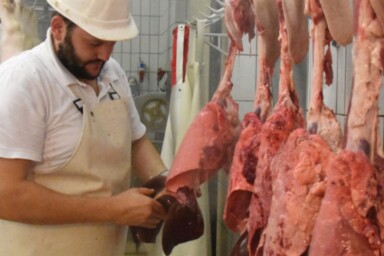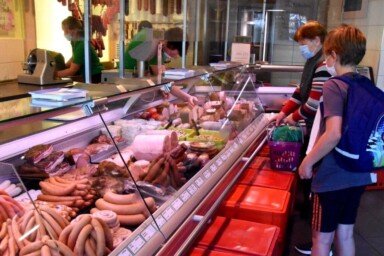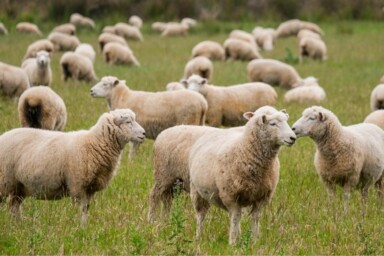Last week we heard from the CEO of the UK’s Food Standards Agency(FSA) that, ‘We could do so much more to join up our thinking,’ on food policy. Emily Miles was speaking as part of the Sustainable Food Trust session, Making Small Abattoirs Sustainable at the Oxford Real Farming Conference and gave a refreshingly honest, personal and professional perspective on the issues around small abattoirs and local food.
Pointing out the problems with a centralised supply chain, Emily said, ‘There are some fragile nodes in the food system which, if they go wrong, things start stacking up and causing a problem within days and weeks.’
This was particularly brought home last year when COVID-19 struck, threatening to destabilise increasingly large-scale and centralised systems, particularly in the meat sector. Emily noted that, ‘If you are reliant on a centralised approach to slaughterhouses where lots of product goes through one, two or three big places, as soon as, for instance, you have a COVID outbreak or something else goes wrong, it starts backing up issues along the food chain.’
Emily went on to say, ‘I personally think that a more distributed model is more resilient.’
There has also been a rise in consumer interest in local food, with a third of people buying from local shops more often than they used to, and one in three people buying from a regular local supplier, like a farm shop or a veg box, according to the FSA.
Yet policy and governance is struggling to catch up with this consumer shift and risks failing the public if a more coordinated and enabling framework is not established. According to Emily, fragmentation of governance across the food sector has gotten worse in the last decade with UK food businesses now having to deal with several central government departments and four devolved governments, particularly when it comes to food labelling. She commented, ‘In my view, that does not serve the consumer.’
A leadership group, chaired by Defra Director General, David Kennedy, seeks to address some of the policy-level issues related to Henry Dimbleby’s food strategy work, but Emily hoped it would do more. She felt that operational concerns and data requirements could be better coordinated, particularly for the abattoir sector where different regulations can often collide with each other ‘on the ground’. The Food Standards Agency is seeking to address some of these issues, as well as the problems of a ‘one size fits all’ approach to regulating abattoirs, with a reform programme that will segment abattoirs and apply some ‘earned autonomy’ to the more compliant.
But Emily said, ‘I do think more integration and joint strategic thinking is fundamental. If we want to make a difference to those big challenges in food, around diet and around the environment, Government has got to step up our strategic work in that way.’
The Sustainable Food Trust and others feel this is particularly lacking in recent Government proposals to ban live animal exports for fattening and slaughter and reduce maximum journey times in the UK. Whilst welcoming moves to improve animal welfare, the SFT feels that the proposals and consultation do not consider the provision of abattoirs or whether more will be needed to enable shorter journey times. Commenting on the consultation, Emily said that the FSA welcomed Defra’s commitment to ensuring that the UK position themselves as world leaders on animal welfare. She also observed that, ‘Having a rule about maximum journey times, without having an infrastructure to support that from the slaughterhouses, would naturally be problematic.’
Marisa Heath of the All-Party Parliamentary Group for Animal Welfare (APGAW) also spoke on last week’s conference panel and commented on this issue. Marisa said, ‘We’re concerned that the consultation doesn’t talk enough about the provision of local abattoirs.’ This will be raised in a response to the consultation by the newly formed Abattoir Sector Group, founded by APGAW and other organisations, including the Sustainable Food Trust.
The group will also be seeking to address priority areas of work, including funding for the sector, robust business planning and adding value to animal by-products. Marisa said, ‘The most shocking thing we saw during our inquiry was hides being thrown away in skips. We want more integrated solutions to better exploit the 5th quarter.’
These solutions may include composting of waste, which was outlined by farmer and abattoir owner Will Harris on the ORFC panel, or adding value to hides and skins, as explained by Grady + Robinson whose project seeks to make sustainably sourced traceable leather, the norm within the fashion industry.
But despite all of these voices, efforts and rising consumer demand, there is still some way to go for a joined up, systemic approach to be adopted when it comes to supply chain infrastructure. Over the next weeks and months, work must be done to bridge those gaps and prioritise a resilient food system that best serves the public interest.
To find out more about the Abattoir Sector Group please email abattoirsectorgroup@gmail.com
Watch the full session at ORFC
Photograph: Angus Birditt







